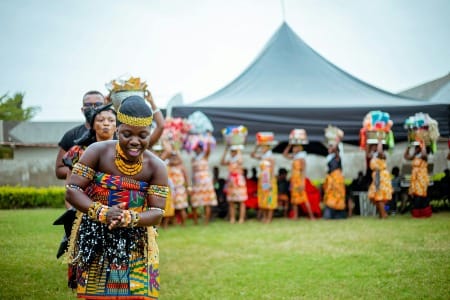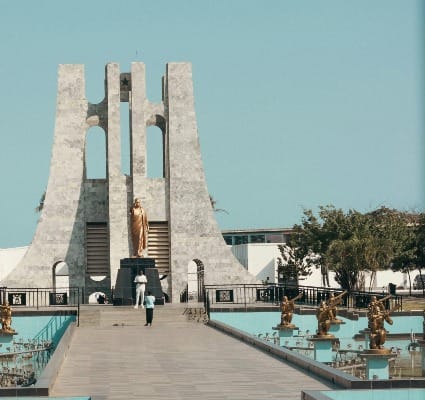Ghana's Tourism Boom: Balancing Economic Growth, Cultural Heritage, and Local Empowerment.

Africa's emergence as a prime tourist destination has been a remarkable phenomenon in recent years. The continent's rich cultural diversity, breathtaking natural beauty, and historic significance have made it an attractive location for travelers seeking a unique experience. Ghana, in particular, has become a hotspot for tourists, with its historic sites, vibrant cities, and stunning coastlines drawing visitors from around the world.
Ghana's steady rise as a top destination for travelers has been driven by its rich culture, breathtaking landscapes, and deep historical significance. Unlike many other places in the region, Ghana stands out not just for its beauty but also for its reputation as one of the most peaceful countries in Sub-Saharan Africa. From the golden stretches of its beaches to the lush greenery and historic castles, the country offers an experience that blends adventure with cultural immersion.
The country's tourism industry has been boosted by several initiatives, including the Year of Return campaign, which was launched by Nana Addo Dankwa Akuffo-Addo in 2019. This campaign invited Africans in the diaspora to reconnect with their roots, explore their heritage, and celebrate African identity. The initiative was a huge success, attracting hundreds of thousands of visitors to Ghana and generating significant revenue for the country's economy.
Ghana's rich cultural heritage is one of its biggest draws for tourists. The country is home to over 100 different ethnic groups, each with its own unique culture and traditions. Visitors can experience the vibrant cultural festivals, try traditional cuisine, and explore museums and cultural centers showcasing the country's history and heritage.

In addition to its cultural attractions, Ghana is home to some of Africa's most beautiful and diverse natural landscapes. From the lush rainforests of the south to the savannas of the north, the country is home to a wide range of flora and fauna. Visitors can explore the many national parks and wildlife reserves, go hiking or birdwatching, or simply relax on one of the country's many beautiful beaches.
The tourism sector, however, seems to have maintained its momentum; because the initiative has seen an influx of Africans in the diaspora, a call marking 400 years since the first recorded enslaved Africans. According to the Ministry of Tourism, over 237,000 visitors flocked to the shores of Ghana during Christmas 2019, estimating that about $1.9 billion was pumped into the Ghanaian economy.
With an endless list of festivals including Detty December, Afrochella, Freedom Rave and the Black Star Line Festival, which was created by American rappers Vic Mensa and Chance the Rapper, bringing international collaborations, the country was a hub for many prominent musicians all across the continent.
Obviously, to every visit away from home there is a driving motive ( Mak, Wong & Chang, 2009). With that said, the tourist doing the visit, the site putting together the best possible experience for tourists and the economy at immense benefits. This is because the tourist essentially wants to have the experience and seek novelty in the face of the place of visit. Preceding from that premise, the tourist sites also make the best arrangements for them.
While Ghana remains a top destination for tourists, it has also sparked concerns about inflation, high cost of living, and the sudden surge in prices of goods and services has become a significant issue that needs addressing. This means that companies and brands see such tourist destinations as an opportunity to make profit because of the enviable nature and the foreigners that pass through. As a result, prices on essentials like foodstuffs, clothing, and event experiences have skyrocketed, with some vendors charging exorbitant prices and rates in foreign currencies to match demand. Beyond business, individuals have found ways to capitalize on the influx of visitors, offering personal tours, exclusive travel packages and even private accommodations at inflated rates.
The surge in tourism to Ghana, driven by initiatives like the "Year of Return" and "Beyond the Return," has significantly boosted the economy, generating $3.8 billion in 2023. This growth benefits both local communities and multinational companies. Locals gain employment opportunities and revenue from tourism-related activities, such as lodging and food services. However, concerns arise about the distribution of benefits, as multinational companies may capture a larger share of profits.

The diaspora tourism, in particular, reconnects individuals with their ancestral roots, fostering cultural exchange and economic growth. Yet, tensions exist due to economic disparities and the influx of diasporans, which can strain local resources. To ensure equitable benefits, Ghana's tourism sector must prioritize sustainable practices and local economic empowerment, ensuring that multinational companies do not overshadow local interests.
While tourism offers economic advantages, careful management is needed to prevent exploitation and ensure that local communities and multinational entities benefit fairly. This includes promoting domestic tourism and implementing policies that support local economic growth.
Looking at how weak domestic tourism is, and the financial weakness of most local industries, the statistics show that the multinational companies benefit economically. It's culturally beneficial to all, fair to assume, but we still have a lot to do in boosting our local tourism industry and leveling the playing ground for economic gains.
Do you think Ghana’s tourism industry is on the right path, or are there areas that need urgent attention? Share your perspectives in the comments section below!
The Equatorial Gulf is an independent group of writers dedicated to insightful analysis and thought-provoking discussions on global and regional topics.
Comments ()